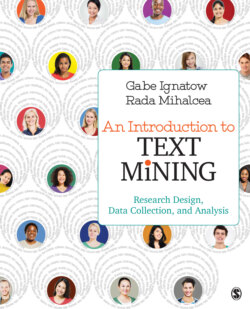Читать книгу An Introduction to Text Mining - Gabe Ignatow - Страница 47
На сайте Литреса книга снята с продажи.
Scenario 3
ОглавлениеIn the third scenario, three graduate students were chatting one evening about their frustrations. Student A said that she had written a final paper for a course taught by her adviser. When she asked him if the paper was worthy of submitting to a conference, her adviser said that it is worth submitting and suggested the insertion of a few references. He then requested that he be listed as the paper’s coauthor. Student B then shared the story of his adviser’s request. He explained that as he wrote his dissertation he received wonderful support from his adviser, but once the dissertation was completed his adviser insisted on being first author on all publications coming out of the dissertation research. Student C trumped all three by saying that her adviser told her that he owns the data and all intellectual property (IP) coming from the dissertation because he consented to supervise her research.
How is authorship resulting from your research determined?
Who owns the IP and data from your research?
Scenarios 1, 2, and 3 all represent ethics violations related to authorship and publishing, and they all represent patterns of faculty behavior that occur quite more often than we might prefer to believe. What would you do in each scenario? In each of the scenarios, the faculty adviser has immense power over the student’s future academic career. An adviser who refuses to write a letter of recommendation for a student for a job or graduate school or who writes an unflattering letter can cause permanent damage to the student’s career. Davis and Madsen considered these and other ethical scenarios on their blog post, which is a very useful resource (http://ethicist.aom.org/2013/02/ethics-in-research-scenarios-what-would-you-do). You can also refer to the research ethics sites in the Web Resources and Further Reading sections toward the end of the chapter.
Conclusion
Choosing appropriate guidelines for text mining research can pose a serious challenge. Watson, Jones, and Burns (2007) suggested that it is impractical to suppose any single set of guidelines could address all issues concerning online research due to the diversity of online platforms and communities. Hair and Clark (2007) made the point that what might be considered ethical research conduct in one community might be considered unethical in others. In light of this uncertainty, it is critically important that you pay close attention to what is considered ethical conduct within the online community or communities you choose to study. And you should consider multiple sets of guidelines for your text mining research project rather than a single set. If a review of literature from within your academic discipline does not provide clear ethical guidelines for text mining research or other forms of research using user-generated online data, you should consult literature from closely related fields.
Research involving the collection of data about people through social media and networking sites involves many of the same considerations as any other research with human participants, including determining appropriate informed consent processes, assuring that participation is voluntary whenever possible, protecting the privacy of individuals and the confidentiality of data collected, and minimizing risks to participants. Clearly, if you are working within a university you must consult with your IRB before collecting or analyzing any user-generated textual data.
